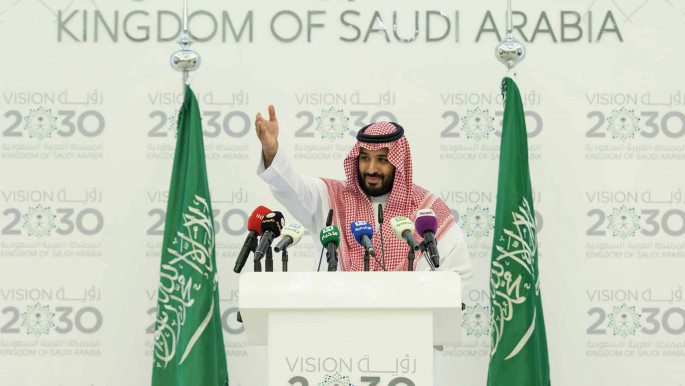Saudi Arabia's new kingdom: 'Reform accelerated by repression'
While cultural barriers to trade and religious restrictions are being loosened, however, the kingdom's iron-fisted control on free speech and open debate remains alive and well, if not thriving.
A recent report by Bloomberg highlights the how the kingdom's 'liberal' transition has been driven by the same machinery of repression, which has intensified under the ambitious and inexperienced crown prince Mohammed bin Salman.
According to James Dorsey, a Middle East specialist at Singapore's Nanyang Technological University, the rolling out of Bin Salman's new programme has marked "a break with the era of King Abdullah, who often sought to forge consensus." Unlike in previous times, when an albeit limited space existed for dissent and debate, "the Salman's do not tolerate any criticism whatsoever."
Chastising the choir
The contradiction between the kingdom's new 'openness' and its clampdown on criticism can be seen in its recent reform of laws on driving. While many Saudi religious scholars were previously unapologetic in their support for draconian laws and regressive views towards women, their religious convictions swiftly fell in line with Bin Salman's new programme.
Even Mohammed al-Arifi, a scholar who once detailed how a Muslim man should beat his wife, came out in support of the new reform.
"A modest woman will remain modest whether she drives or not," al-Arifi said, echoing the resounding chorus of approval from other senior Saudi clerics.
 |
| Crown Prince Mohammad bin Salman has been presented to the world as a moderniser of the ultra-conservative kingdom [AFP] |
Indeed, just weeks before the lifting of the ban, a Saudi Muslim preacher had felt comfortable enough to claim that women are unable to drive because their brains are a "quarter" of that of a man.
He was later removed from his post, however the state's intervention in his case was perhaps not what enforced the broader change of heart among the kingdom's religious elite about female drivers.
Arifi and co would have been well aware that earlier in September, Saudi police rounded up over a dozen prominent preachers who were charged with "pushing an extremist agenda."
Among those arrested was prominent Muslim preacher Salman al-Awdah, a Muslim cleric with a Twitter following of over 14 million.
Al-Awdah's crime, it appeared, was that he posted a Tweet that seemed to welcome reconciliation between Qatar and Saudi Arabia - a rift known to have spearheaded by Bin Salman himself.
The 'vibrant society'
Saudi women will soon be able to drive, female singers have returned to television screens and plans are underway for the creation of a Saudi "entertainment city".
 |
The country is going through a generational succession, the government is undertaking a herculean effort to restructure the country amid low oil prices, and it's under attack by Shia and Sunni jihadis and Iran |  |
"You need a very firm hand to see this through without provoking chaos," Ali Shihabi, executive director of the Arabia Foundation in Washington, was quoted by Bloomberg as saying.
"The country is going through a generational succession, the government is undertaking a herculean effort to restructure the country amid low oil prices, and it's under attack by Shia and Sunni jihadis and Iran."
Bin Salman's rise has focused power around his close circle, crushing and alienating those who stand in the way.
Former crown prince Mohammed bin Nayef found this out when he was reportedly placed under house arrest after acquiescing his position as crown prince to Bin Salman.
Seeking consensus, Shihabi adds, would prove fruitless, because "the political spectrum between the conservatives and the liberals is so wide as to be impossible to reconcile."
A 'public relations coup'
Bin Salman's contradictory programme of authoritarian-led liberalisation has been accompanied by a media campaign orchestrated to sell the new programme both to the world and to Saudis of all political shades.
Decades of disinterest in external communications have ended with the kingdom hiring public relations firms and tech-savvy English speakers to drive its new media machine.
While at times this has taken the form of the young prince publicly cosying up to conservatives like al-Arifi, or meeting with Facebook founder Mark Zuckerberg, the public relations assault thinly veils the young prince's authoritarian tendencies.
Just last week, 22 people, including a Qatari citizen, were arrested for "inciting public opinion" on social media.
"Saudi Arabia never was an open society, but it never was a kingdom of fear," Jamal Khashoggi, a self-exiled senior journalist and former government adviser told Bloomberg. According to Khashoggi, the arrests are "part of the closing down of space for freedom of expression".
 |
The media and the electronic army are being encouraged to go after those people ... It's very Orwellian. |  |
Worryingly, the long arm of the state has been aided by the fostering of public social media witch hunts of alleged saboteurs and traitors. In August, royal adviser Saud al-Qahtani launched the Twitter hashtag "black list," with which he urged citizens to name and shame alleged supporters of Qatar.
Al-Qahtani wrote at the time that there would be "tough judgment and pursuit" for each and every "mercenary" who gets blacklisted.
Among those recently targeted by the witch hunts are a popular YouTube comedian and satirist and a women's rights activist.
Khashoggi has also been attacked online and branded as a traitor and "mercenary".
"The media and the electronic army are being encouraged to go after those people," he said. "It's very Orwellian."



